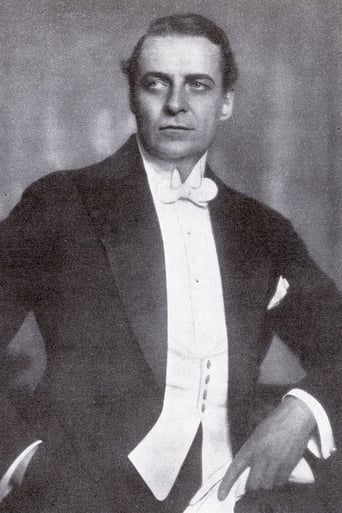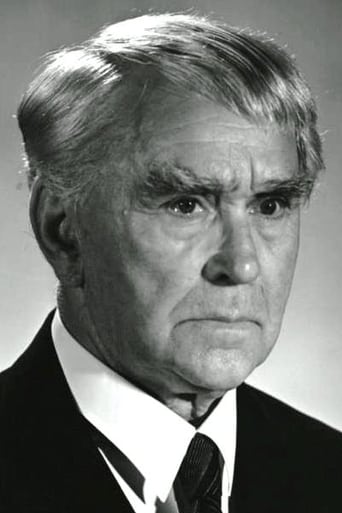Matrixston
Wow! Such a good movie.
Greenes
Please don't spend money on this.
ReaderKenka
Let's be realistic.
Kaydan Christian
A terrific literary drama and character piece that shows how the process of creating art can be seen differently by those doing it and those looking at it from the outside.
Hitchcoc
I will start with the positives. The high quality of the film used here is quite remarkable. The sets are sharp and focused; the characters facial expressions are easy to read. The special effects are nicely done. I guess I can forgive some of the bad science, but let's face it, astronomy had reached some pretty spectacular levels, even in 1916. To simply ignore the pull of gravity, the time to travel from planet to planet in such a vehicle, and the oxygen levels and other absurd coincidences, isn't right. What we have here is a silly religious allegory like "A Pilgrim's Progress." The Martians for some reason are quite advanced. Their planet is a gigantic hippie colony where the men wear doilies on their heads and they spout a pacifist view of their world (apparently, they had wars and devastation in the past and have learned from it). This is well and good, but they don't seem to do much of anything but roam around like an ant colony. I guess this is heaven. The invaders some in and kill one of their swans and set off a grenade. They are arrested and tried and then nothing happens. Of course, there's the romance of the leader and the young Martian girl. I could go on, but the thing I praised at the beginning make the fact that the film itself is such a dud kind of sad. One character I haven't mentioned is Professor Dubius (he's dubious--get it?), who jealously taunts the astronauts, making fun of their leader and announcing to the scientific community what idiots they are. He has failed in his lifetime to accomplish what they have accomplished. When all the fact are in, I think he would have been an interesting counter the pack of schmucks that end up on Mars.
Edgar Soberon Torchia
I do not know how planet Mars turned into a source of horrors and ugly aliens, after receiving the name of the Roman god of war or being represented in a flattering and intelligent way in this magnificent Danish motion picture. It tells the story of a group of men who follow an inspired pilot who has envisioned his life mission in a sidereal trip to Mars, without imagining what he and his crew were going to find. And what they find up there, by 1918 standards, is amazing: a peaceful community that abstains from killing men or animals of any kind, whose main sources of nourishment are fruits, who have the power to regenerate life, induce healing dreams and aspirational thoughts. After causing havoc with guns and bombs, and after their beverages and canned dead meat are rejected, the men go through a process of adjustment and enlightenment. It doesn't take long for the leader to find his soul mate in Mars, and they all decide to go back to Earth to transmit the Martian philosophy of existence, that is summarized in the verses of the chant the planet's population sing as the travelers leave: space is the mother of life, as it embraces all our globes; we are all equal, we are all steps on the same ladder that leads to eternity; love is the force we humans call God, and only through Love we shall reach flawlessness. The Martians even urges us to get rid of lowly speech, which has become a plague in speech and writing, defiling communication and self expression. All this is done, seen and expressed through handsome images and special effects, in less than 80 minutes. The film even has a bit of humor in the depiction of the evil Professor Dubius (who is obviously dubious of the mission and its success), comically played by Frederik Jacobsen, even when being at his meanest; and the filmmakers also made a bit of social critique, representing irrationality and arrogance through an American character (David Dane, played by Svend Kornbeck), a boisterous, drinking fool, who organizes a mutiny in the spaceship. But while the Professor Dubius is punished, Dane is transformed by the Martian experience. In spite of a few unstable sets or the acting style of the day, this is an excellent film. Just as many may consider outdated the technical aspects of the science-fiction plot, or find ridiculous the tendencies of the cast to stretch out arms as if declaiming an epic poem, and to frequently kneel to suggest reverence, piety of humility, possibly in a hundred years from now the Method acting style of today and our notions of technology would be seen as laughable, so there is no reason why to make a fuss about these aspects and oversize the limitations that surge from the thought and knowledge of the time when "A Trip to Mars" was made. Highly recommended.
MARIO GAUCI
The only time I've seen this rare Scandinavian foray into sci-fi territory mentioned anywhere - prior to its DVD availability courtesy of the Danish Film Institute - was in a literate appraisal of the genre by noted critic Philip Strick (who, incidentally, passed away recently). This alone would make it interesting and a film to seek out - but, alas, while undeniably good to look at (a traditionally Danish quality, I might add), dramatically it turned out to be a major disappointment! Apart from being technically stilted and plagued by the exaggerated gestures of the actors (a well-established liability of most Silent-era product), it also presents a totally different view of Mars and its inhabitants to the one we've grown accustomed to seeing in later American films tinged by paranoia. Not only is there no concentrated effort to show an alternative landscape for the red planet, but the Martians themselves are merely benevolent humans fitted in Roman-era attire (with the addition of some outlandish accoutrements): apparently, they were once as 'barbaric' as us but have gradually attained enlightenment - and, though their language is different from that of their earthly visitors, they're somehow able to transmit their thoughts to them! In essence, it's clear that the film is infused with the last remnants of 19th century Romanticism (some of the title cards are unbelievably hokey) which Weimar Germany and, then, the Wall Street crash helped eradicate - leading to a change in the general attitude of cinema.The ultimate intent of the picture, obviously, was a general plea for tolerance and understanding (WWI was still raging when the film emerged); however, while certainly watchable (and short enough at 81 minutes not to lapse into boredom), the almost total lack of tension between the inhabitants of the two planets - where, back home, it's represented by the ripe but highly amusing villainy of a Mephistophelean character who, eventually, gets his just desserts by way of a lightning bolt! - makes for an altogether dull narrative. Besides, virtually none of the occupants of the vessel - which itself constitutes nothing more fanciful than an airship - who have been assembled from all over the world (and are contemplating mutiny against their stoic captain when the journey takes longer than expected!) get to do much of anything once they land on Mars!!
F Gwynplaine MacIntyre
I saw "Heaven-Ship" ("Himmelskibet") at the 2006 Cinema Muto festival in Sacile, Italy. What a great movie! This Danish steampunk saga is the stirring tale of the first trip to Mars, in an era when wireless telegraphy hasn't been perfected. The spaceship hasn't got a radio, and the heroes are brought back from the landing field via horsecart. Even the intertitles are delightful ... some of them written in rhymed couplets in the original Danish.The actors' performances are laughable, largely hand-to-brow histrionics. But the sets are astonishing, easily surpassing anything done by Georges Melies a decade earlier (or in "Die Frau im Mond" a decade later). Of course, the plot is simplistic. The spaceship's crew consist of seven thin guys and one fat slob. Guess which one cracks. Interestingly, everyone in this movie (except the dubious Professor Dubius) ardently believes in God. Even the Martians.Impressively, the scenarists have the sense to acknowledge that a trip to Mars is no doddle: the title cards establish that it takes the scientists two years to build their spaceship (which has an airscrew) and six months to reach Mars. During the construction sequence, there's one extremely impressive set-up which must have been choreographed: dozens of workers all hustle through the worksite in different directions, with no hesitations and no collisions. The Danish scientists christen their ship "Excelsior" ("packing materials"?) and set course for Mars, even though the Moon and Venus are closer. When the ship (which flies horizontally, not vertically) lands on Mars, it is greeted by "Marsboerne" -- Martians -- who turn out to be Nordic blondes, all highly-developed pacifists and vegetarians. (As a highly-developed meat-eater, I resented that part.)Conveniently enough, Mars turns out to have an atmosphere just like Earth's, as well as equal gravity. In an exterior shot of the Martian landscape, the Sun's apparent magnitude when seen from Mars is the same as it is when viewed from Earth. I also couldn't help observing that all the wise elder Martians are male. In fact, female elders are thin on the ground here: both the Earth-born hero and the Martian maiden are motherless. The Martians speak a universal language, wear ankhs on their robes, and greet the Earth visitors with a globe of Earth ... which of course they hold with its North Pole upward.That Martian maiden is Marya, played by an ethereally beautiful Danish actress. (Waiter, I'll have some of that Danish!) We see a Martian dance of chastity which might have been twee or ludicrous but is actually quite touching and beautiful. Also, the Martian funeral scene features one shot which reminded me of a sequence in "The Seventh Seal". I wonder if Ingmar Bergman saw this film."Himmelskibet" has a few flaws, but its production design and its other merits very far outweigh its drawbacks. The Ole Olsen who is named in the credits (and who appears in a brief prologue) is no relation to Chic Johnson's vaudeville partner from "Hellzapoppin". I would give "Himmelskibet" a 12, but the scale tops off at 10 ... so, a full 10 out of 10 for this delightful trip to Mars, the blonde planet!







